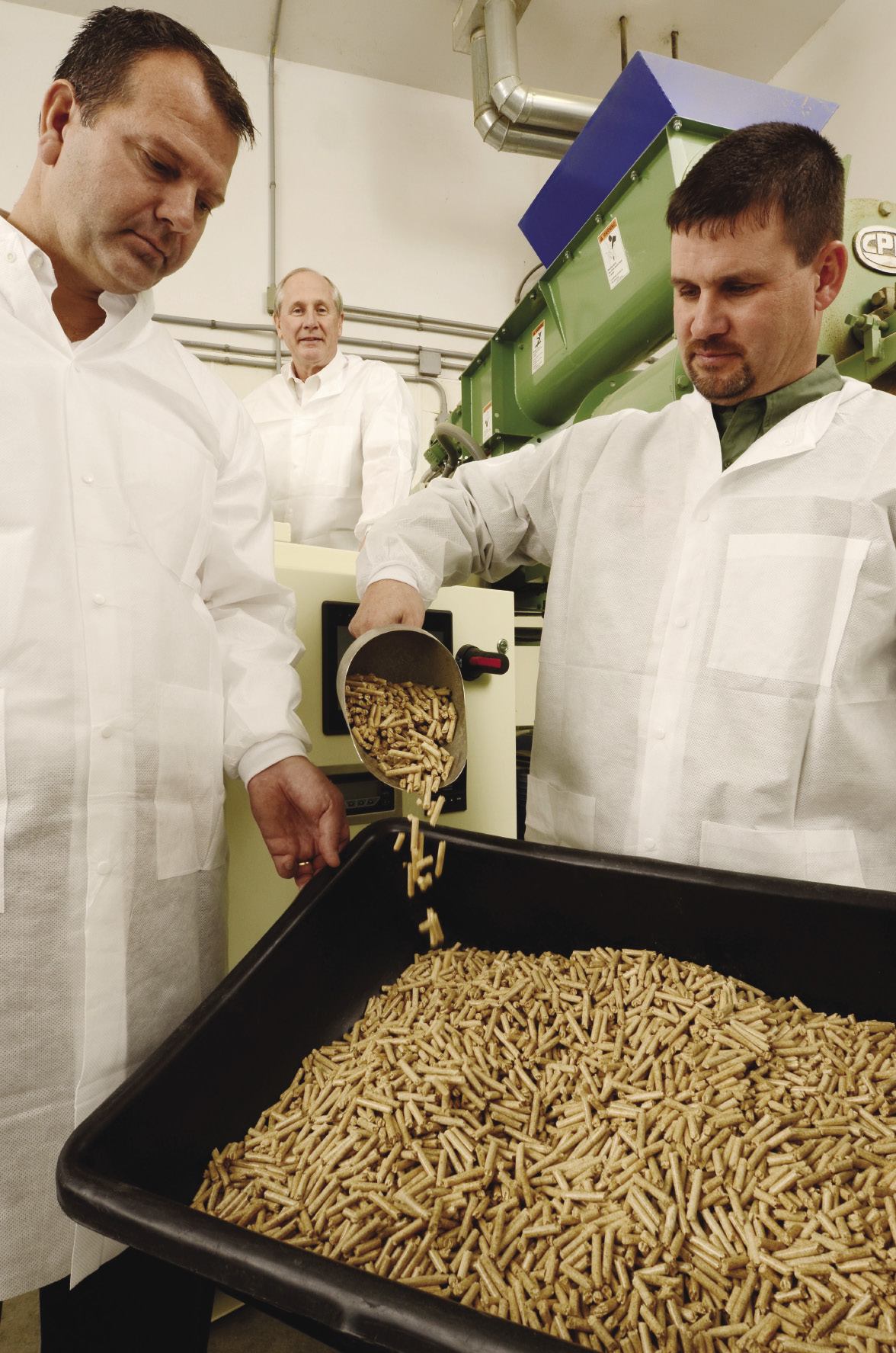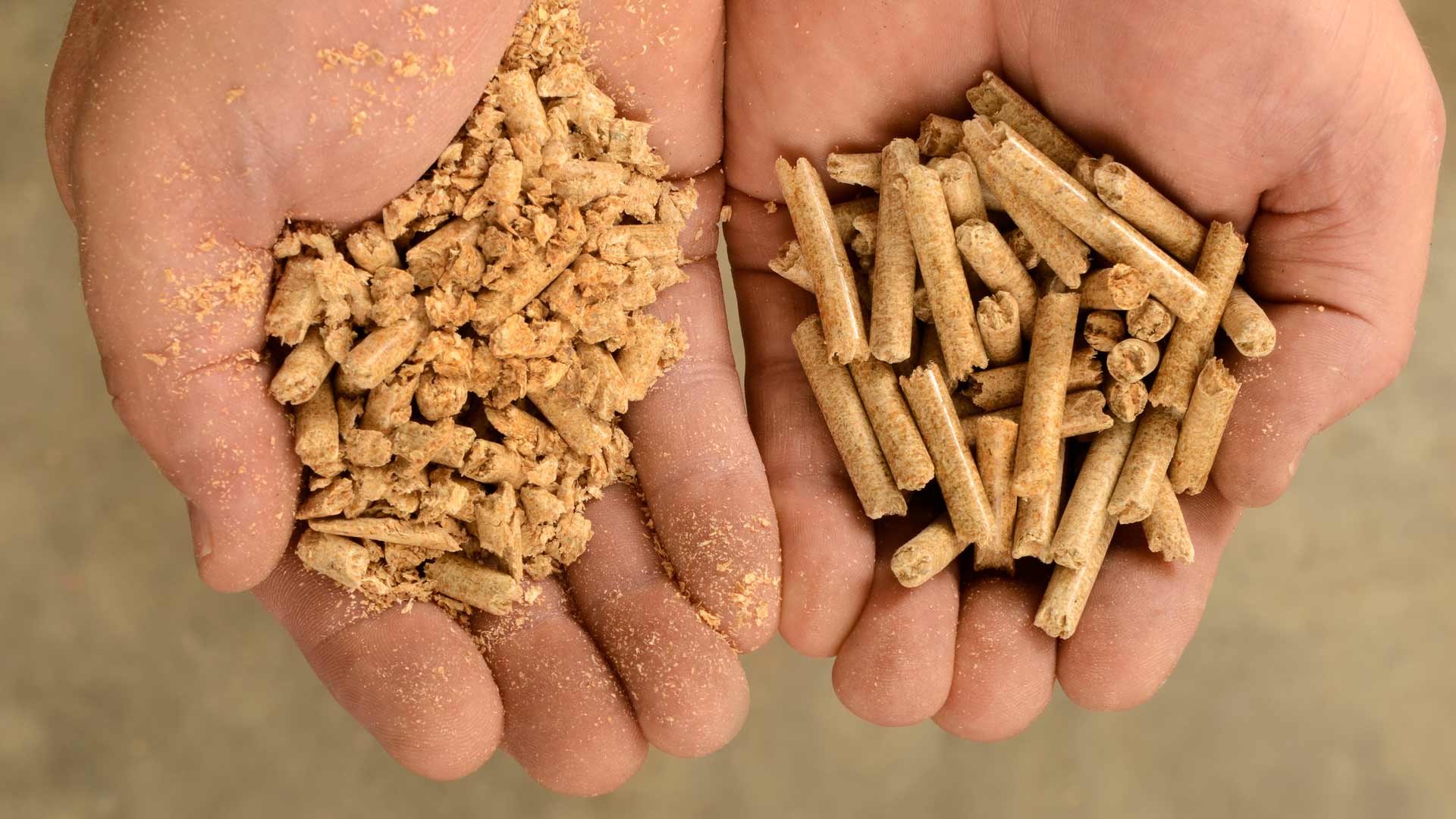Winnebago, Minn. — American Bio-Labs is pursuing pellet perfection.
The 6-year-old company has developed an integrated system that speeds up the production of feed and fuel pellets and improves pellet quality. The company recently finished testing its patented Slip-Stik™ process and is now preparing to market the system.
In trials at AURI’s pilot lab in Waseca, Slip-Stik improved the pellet durability index of crumbly, high-oil livestock feed pellets, such as dried distillers grains, by 10 to 30 percent, says Al Doering, AURI coproducts scientist. For wood pellets, Slip-Stik improved mill “throughput,” or volume per hour, by 18 to 30 percent — without a loss of pellet durability. That’s an astounding increase in efficiency,
Doering says.
These improvements could easily be worth “tens of millions of dollars” in lower costs and greater efficiency for feed and biomass pellet manufacturers and livestock feeders, says Bruce Dorendorf, American Bio-Labs co-founder and president.
An adjustable system
The Slip-Stik process includes an innovative pellet-enhancing material, plus a “bolt-on” applicator that works with any existing pellet mill, Dorendorf says.
The EC-40™ enhancer improves pellet adhesion, slipperiness and water resistance, the company says. Improved adhesion cuts the amount of heat and pressure needed to form pellets, Dorendorf says, and also raises pellet density. Increased slipperiness speeds up milling, lowering costs.
EC-40, a concentrated powder, is made of natural, biodegradable ingredients and is approved for use in livestock feed.
The automated application system, SM-1, combines the EC-40 concentrate with hot water, and injects the solution into the pellet mill through specialized nozzles. American Bio-Labs developed the stand-alone applicator in collaboration with Easy Automation, Inc., a Welcome, Minn., company that makes computer-controlled feed processing systems.
One of the big advantages of hydrating the EC-40 concentrate at the pellet mill is logistics, Dorendorf says. “You’re not bringing in pallets of material,” which saves labor. Less than a pound of EC-40 is needed to improve a ton of feed pellets.
The Slip-Stik process is easily adapted for different raw materials, pellet specifications or milling needs, Dorendorf says. Often, feed producers are moving many different diet formulations through the same mill. “Our process lets them alter pellet characteristics on the fly,” adjusting for variables like pellet hardness, pH, moisture and material throughput.
Better feed pellet needed

The original Slip-Stik concept was borrowed from an unrelated industry, says Dorendorf, a Minnesota businessman and entrepreneur. “I was involved in another venture, and they were using a product that I thought could have applications in agriculture.”
Dorendorf passed his hunch along to neighbor Scott Hislop, a sixth generation farmer and owner of Choice Connection, a Mapleton hog operation, and Choice Connection’s consulting veterinarian, Dr. Brian Caldwell. “I asked Scott and Brian, ‘What could we do with this? Is there potential for agriculture?’ ”
Hislop and Caldwell recognized an opportunity to improve feed pellets, a growing need in the livestock industry.
Feeds with more than 3 percent fat “are very difficult to pellet,” Doering says. The soft pellets fall apart during handling, resulting in lots of fines and wasted feed.
In the livestock barn, “pellet quality affects feed conversion,” Caldwell says. That’s the amount of food an animal has to eat to gain a pound. Wasted feed means higher production costs. As grain prices have climbed, “the value of pellet quality has never been as high as it is today,” he says. The swine industry, in particular, “is seeing greater value in pelleting feed,” Hislop adds.
In 2006, the three businessmen formed American Bio-Labs, along with two other investors, and began their pursuit of a perfect pellet. There was just one hitch: “We have livestock backgrounds,” Caldwell says. “We didn’t know squat about making pellets.”
Enter AURI
In 2007, the company contacted Doering for help. “We felt confident coming to AURI” with a new idea, Hislop says, “knowing it would be held in confidence.”
Doering has tested thousands of pellet formulations in AURI’s pilot lab, and helped hundreds of Minnesota companies pelletize livestock and pet food, solid biomass fuel and natural fertilizers.
Over the course of the next five years, Doering worked with American Bio-Labs to test more than 30 versions of the Slip-Stik process. During the long development phase, a couple of unexpected opportunities appeared.
“Initially, we were focused on improving feed pellet durability,” Dorendorf says. In the AURI lab, they discovered that the product had another valuable characteristic — it was very slippery. That meant pellet mill operators could improve pellet durability without having to slow down the processing speed. Ordinarily, Dorendorf says, “you have to sacrifice throughput to get better quality.”
They also learned that the Slip-Stik process was a great benefit in pelletizing wood. Throughput for aspen pellets, for example, leaped by nearly one-third. Doering recalls his surprise: “I looked at them and said, ‘Nobody’s going to believe this.’ ” Not all the biomass materials they tested saw such a big jump in pelleting efficiency, Doering says, “but even a five or ten percent improvement is huge in this industry.”
After lab trials were completed last year, American Bio-Labs tested the Slip-Stick system in a variety of commercial pellet mills. In addition to validating performance claims, “we were testing financial viability,” Dorendorf says.
“Agriculture, in general, is a low-margin business,” Hislop says. “So our process needed to be economical. That’s part of the reason it took so long to develop.” Adds Dorendorf: “We feel confident that producers will see economic benefit from this.”
Moving ahead
American Bio-Labs expects to move ahead with full commercialization this year. Up to this point, product development has been financed entirely by shareholder equity. “We have no debt so far,” Dorendorf says. “Early on we decided to fund development internally so we weren’t under pressure to take it to the marketplace prematurely.”
There have been plenty of ups and downs getting this venture launched, Caldwell says: “Just about the time you think you have it figured out, it doesn’t work the way you expect, and then you have to figure out what went wrong.”
“We’ve tried to take a methodical approach to development and commercialization,” Dorendorf says. In the process, the three entrepreneurs have become good friends and discovered that they share a common outlook. “We’re like-minded people,” Hislop says. “Our glass is always half full.”
Quips Dorendorf: “Yes, and we’re trying to get it full!”
AURI & American Bio-Labs
Idea to opportunity: American Bio-Labs found a material that could potentially improve feed pellet durability and brought it to AURI for testing and development.
Outcomes: Trials by Al Doering, at AURI’s pilot lab in Waseca, show American Bio-Labs new Slip-Stik™ process improves pellet density, durability and speeds up the production process.

